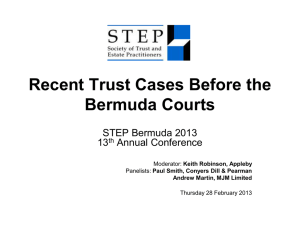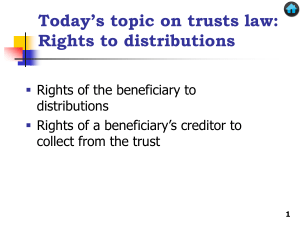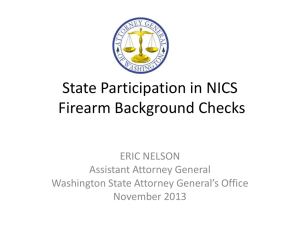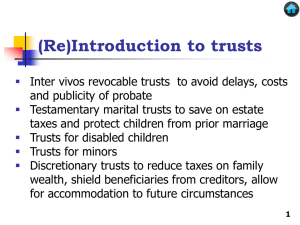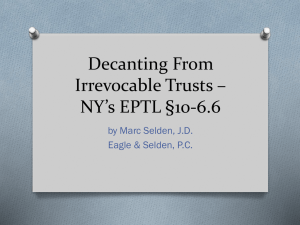Evolving Obligations of Fiduciaries in Washington State
advertisement
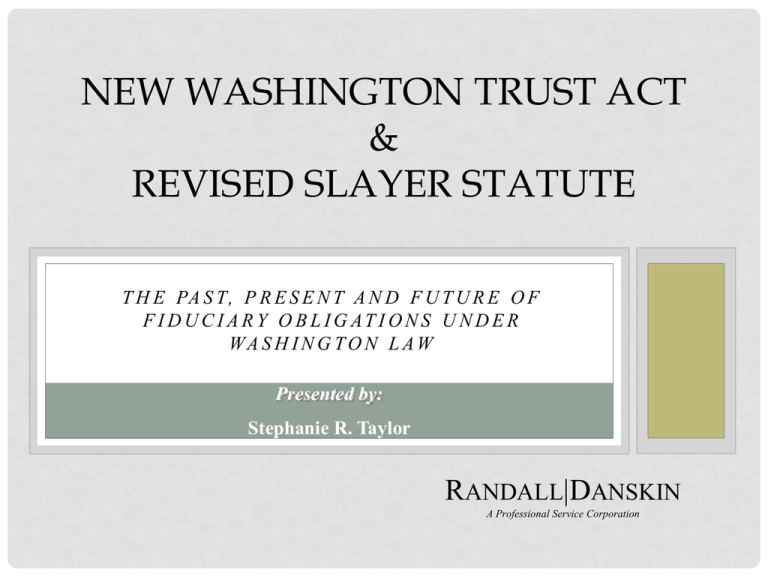
NEW WASHINGTON TRUST ACT & REVISED SLAYER STATUTE T H E PA S T, P R E S E N T A N D F U T U R E O F F IDUCIA RY OB LIGATIONS UNDE R WA S H I N G T O N L A W Presented by: Stephanie R. Taylor RANDALL|DANSKIN A Professional Service Corporation Existing Statutes Impacted by SHB 1051 • RCW 11.02.005 • RCW 11.28.237 • RCW 11.68.090 • RCW 11.94.050 • • • • • • • • RCW 11.96A.030 RCW 11.96A.050 RCW 11.96A.070 RCW 11.96A.110 RCW 11.96A.120 RCW 11.97.010 RCW 11.98.009 RCW 11.98.039 • RCW 11.98.045 • RCW 11.98.051 • • • • RCW 11.98.055 RCW 11.98.070 RCW 11.98.090 RCW 11.100.090 Definitions and Use of Terms Notice of Appointment as Personal Representative, Pendency of Probate –Proof by Affidavit Powers of Personal Representative Under Nonintervention Will – Scope – Relief from Duties, Restrictions, Liabilities by Will Attorney or Agent Granted Principal’s Powers – Powers to be Specifically Provided For – Transfer of Resources by Principal’s Attorney or Agent Definitions (TEDRA) Venue in Proceedings Involving Probate or Trust Matters Statutes of Limitation Notice in Judicial Proceedings Under this Title Requiring Notice Application of Doctrine of Virtual Representation Power of Trustor –Trust Provisions Control Application of Chapter [Trusts] Nonjudicial change of trustee – Judicial appointment or change of trustee – Liability and duties of successor fiduciary Criteria for transfer of trust assets or administration Nonjudicial transfer of trust assets or administration – Notice – Consent required Judicial transfer of trust assets or administration Power of trustee Nonliability of third persons without knowledge of breach [Investment of Trust Funds] Dealings with self or affiliate New Sections Added to Existing Chapters • RCW 11.96A • RCW 11.97 • RCW 11.98 • Title 11 Trust and Estate Dispute Resolution (TEDRA) Effect of Trust Instrument Trusts PROBATE AND TRUST LAWS STATUTES AFFECTED BY PROPOSED AMENDMENTS RCW11.36.021 Trustees – who may serve RCW 11.96A.050 Venue in proceedings involving probate or trust matters RCW 11.96A.070 Statutes of limitations RCW 11.96A.120 Virtual Representation RCW 11.96A.125 Mistake of fact or law in terms of will or trust – Judicial reform RCW 11.97.010 Power of trustor – Trust provisions control RCW 11.98.005 Trust situs and governing law RCW 11.98.019 Relinquishment of powers by Trustee RCW 11.98.039 Nonjudicial change of trustee – Judicial appointment or change of trustee – Liability and duties of successor fiduciary RCW 11.98.041 Change of trustee- Discharge of outgoing trustee, when RCW 11.98.045 Criteria for transfer of trust assets or administration RCW 11.98.051 Nonjudicial transfer of trust assets or adminsitration – Notice – Right to Object RCW 11.98.080 Consolidation of trusts RCW 11.103.040 Trustor’s powers – Powers of withdrawal RCW 11.103.050 Limitation on action contesting validity of revocable trust –Distribution of trust property Proposed New RCWs Added to Existing Chapters RCW 11.98.004 NEW SECTION – Definitions RCW 11.98.015 NEW SECTION – Accepting or declining trusteeship RCW 11.98.071 NEW SECTION – Duty to keep beneficiaries informed NEW SECTION - Application FIDUCIARY OBLIGATIONS • Duty of Loyalty - RCW 11.98.078 • Codifies duty of loyalty • Spells out circumstances in which trustee must provide additional information to beneficiary • Sale, encumbrance or transaction involving the investment or management of trust property entered into by the trustee for the trustee’s own personal account or • Transaction which is otherwise affected by a conflict between the trustee’s fiduciary and personal interests • Transaction is voidable by beneficiary (without further proof) unless: • • • • • Trust authorized transaction Court approved (TEDRA Agreement) SOL has expired Beneficiary consented, ratified or released the Trustee Transaction was executed prior to the fiduciary relationship FIDUCIARY OBLIGATIONS (con’t) • Transaction is “presumed” to be a conflict if it is entered into by the trustee with…a corporation or other enterprise in which the trustee, or a person that owns a significant interest in the trustee, has an interest that might affect the trustee’s best judgment • Presumption can be overcome if the trustee establishes that the conflict did not adversely affect the interests of the beneficiaries • Conflict does not exist in an investment by the trustee in securities of an investment company to which the trustee provides services in a capacity other than as trustee • Investment must comply with the prudent investor rules NOTICE TO BENEFICIARIES • Prior Law – Case Law • Allard v. Pacific Nat’l Bank, 99 Wn.2d 394 (1983) • “That the settlor has created a trust and thus required the beneficiaries to enjoy their property interests indirectly does not imply the beneficiaries are to be kept in ignorance of the trust, the nature of the trust property and the details of its administration.” • A Trustee has a duty to inform beneficiaries fully of all facts which would aid them in protecting their interests • RCW 11.100.140 • A trustee must provide written notice of any "significant non-routine transaction" to "each person who is eighteen years or older and to whom income is presently payable or for whom income is presently being accumulated for distribution as income…." • However, this statute does not abrogate the Trustee’s obligation to keep the beneficiaries reasonably informed of all facts. Flohr v. Flohr, (unpublished) 2002 Wn. App. LEXIS 590. NOTICE TO BENEFICIARIES (con’t) • RCW 11.97.010(2) – Initial Notice • Within 60 days of the acceptance of an irrevocable trust (or a revocable trust becomes irrevocable), the Trustee shall give notice of: • • • • The existence of the trust The identity of the trustor(s); The Trustee’s name, address and telephone number; and The right to request such information as is reasonably necessary to enable the enforcement of the beneficiary’s rights • Proposed Revision – RCW 11.97.010(2) is deleted; Replaced by New Section RCW 11.98.070 PROPOSED NOTICE TO BENEFICIARIES • [Proposed] RCW 11.98.071 – Duty to keep beneficiaries informed • (1) A trustee shall keep all “qualified beneficiaries” reasonably informed about the administration of the trust and the material facts necessary for them to protect their interests • “Qualified Beneficiaries” defined by RCW 11.98.004 (Proposed New Section) • (2) Sixty (60) day notice of existence of trust to Qualified Beneficiaries NOTICE TO BENEFICIARIES (con’t) • Notice of Administration of the Trust – Revised RCW 11.97.010(3) • What information do they receive? • All material facts necessary for them to protect their interests • Presumption that information is sufficient if it contains: • • • • • • • • Receipts and disbursements of principal and income Beginning and ending values of assets and liabilities Trustee’s compensation Agents hired by the trustee, their relationship to the trustee, if any, and their compensation Disclosure of any pledge, mortgage, option or lease of trust property, or other agreement affecting trust property binding for 5 years or more Disclosure of all transactions that are affect the duty of loyalty and could be a conflict of interest Statement that the beneficiary may petition the court to obtain a review of the statement and of the acts disclosed Statement that claims against the trustee for breach may not be made after 3 years from the date of the statement NOTICE TO BENEFICIARIES (con’t) • What other information are beneficiaries entitled to? • If requested, all information related to the administration of the trustee unless “unreasonable” under the circumstances • Information must be turned over within 60 days of the receipt of the request NOTICE TO BENEFICIARIES (con’t) • Who receives notice? • All persons “interested in the trust” and • All persons who would be entitled to notice under TEDRA if they were a party to judicial proceedings • Virtual Representation (RCW 11.96A.120 (3)(d) • Power of Appointment - Proposed revisions to RCW 11.96A.120 change the how a holder of a power of appointment may virtually represent the permissible appointees • Minor Beneficiaries • If no guardian has been appointed, notice may be given to parents • Charitable Organizations • Attorney General if interest is future interest only • [Proposed] RCW 11.98.071 – Only qualified beneficiaries entitled to notice PROPOSED NOTICE TO BENEFICIARIES (con’t) • [Proposed] RCW 11.97.010(3) Deleted • Replaced with: • RCW 11.96A.070 – Statutes of limitation (existing with proposed modifications) and • Proposed RCW 11.98.071 – Duty to keep beneficiaries informed • Under the proposed legislation, obligations may be waivable by Trustor • Statute of limitations does not start to run until such time as a beneficiaries receives required information under RCW 11.96A.070 PROPOSED NOTICE TO BENEFICIARIES (con’t) • [Proposed] RCW 11.98.071 – Waiver • Duty to keep beneficiaries reasonably informed is waivable as follows: • (3) TT not required to provide “administration information” to any beneficiary of a trust other than spouse if (a) spouse has capacity; (b) spouse is only “permissible distributee”; and (c) all other “qualified beneficiaries” are descendants of the trustor and the trustor’s spouse • (4)No duty too keep beneficiaries reasonably informed or to inform them of the existence of a revocable trust • (5) The trustor may waive or modify the notification requirement of (2) and (3) in the trust document or in a separate writing, made at any time, that is delivered to the trustee. Result of Breach of Fiduciary Duties • Damages for Breach of Trust (new section to RCW 11.98) • Prior law – discretion with the court • Current Law – A trustee who commits a breach of trust is liable for the greater of: • The amount required to restore the value of the trust property and trust distributions to what they would have been had the breach not occurred; or • The profit the trustee made by reason of the breach WAIVER OF FIDUCIARY OBLIGATIONS • RCW 11.97.010 • The Trustor of a trust may by the provisions of the trust relieve the trustee from any or all of the duties, restrictions and liabilities which would otherwise be imposed by law • Exceptions: • A trustee cannot not relieved of its duty of good faith and honest judgment • A trustee cannot be relieved of its duty to account (See, Estate of Hitchcock, 140 Wn.App. 526 (2007)). • Exculpatory Clauses • A savings clause may save the trustee from liability for • Mistake or error of judgment; • Losses not intentionally or voluntarily incurred; or • Negligence. WAIVER OF FIDUCIARY OBLIGATIONS (con’t) • Non-Waivable Duties and Obligations – • It is against public policy to remove the trustee from all accountability • A provision in a trust instrument is not effective to relieve the trustee of liability for a breach of trust committed in bad faith, or of liability for any profit for which the trustee has derived from a breach of trust. • A saving or exemption provision will not save or limit the trustee from liability for – • Bad faith; • An excess of authority; • An abuse by the trustee of a fiduciary or confidential relationship to the settlor; • Breaches committed intentionally or with reckless disregard to the beneficiary’s interest. WAIVER OF FIDUCIARY OBLIGATIONS (con’t) • RCW 11.97.010 • In no event may a trustee be relieved of the duty to act in good faith and with honest judgment or the duty to provide information to beneficiaries • Exculpation of Trustee RCW 11.98 • An exculpatory “term” which was inserted as the result of an abuse of a fiduciary relationship is unenforceable • An exculpatory “term” drafted or caused to be drafted by the trustee is invalid as an abuse of a fiduciary relationship unless the trustee proves that the exculpatory “term” is fair under the circumstances and that its existence and contents were adequately communicated to the trustor • Beneficiary may consent, ratify or release trustee STATUTE OF LIMITATIONS • Revocable Trusts • Prior Law – Uncertain • RCW 11.103.050 • Challenge to validity of revocable trust must be made at the earlier of • 2 years (24 months) after Trustor’s death or • 4 months after the Trustee provides notice of trusts’ existence and notice of the time allowed for commencing a challenge STATUTE OF LIMITATIONS (con’t) • Irrevocable Trusts • Challenges to Administration • Prior Law – RCW 11.96A.070(1)(a)(i) • An action against the trustee for breach of fiduciary duty must be brought within 3 years from the earlier of: • The time the alleged breach was discovered or • The time the alleged breach reasonably should have been discovered • The trustee has the burden of establishing when the beneficiary knew or should have known STATUTE OF LIMITATIONS (con’t) • Irrevocable Trusts (con’t) • RCW 11.97.010(3) • If the Trustee provides the written statement required herein, the statue of limitations expires 3 years from the date the beneficiary receives the statement • If the Trustee does not provide the written statement, the statute of limitations is 3 years from the first to occur of: • The removal, resignation, or death of the trustee; • The termination of the beneficiary’s interest in the trust; or • The termination of the trust • Proposed Changes – Delete RCW 11.97.010(3); replace with existing RCW 11.96A.070 Miscellaneous New Provisions • Certification of Trust (New Section to RCW 11.98) Date Trust came into existence Identity of the Trustor Identity and address of current Trustee Relevant powers of Trustee Revocability or Irrevocability Authority of the cotrustees to sign or otherwise authenticate and whether all or less than all are required in order to exercise powers of the trustee • Name of the trust or the titling of the trust assets • • • • • • Miscellaneous New Provisions (Con’t) • Venue - Revised RCW 11.96A.050 • Venue for trusts shall be: • For testamentary trusts, in the superior court of the county where the probate of the will is being administered, where any beneficiary resides or has a place of business, the county where any trustee resides or has a place of business, or the county where any real property that is an asset of the trust is located • For all other trusts, in the superior court where any beneficiary resides, the county where any trustee resides or has a place of business, the county where any real property that is an asset of the trust is located • Upon request for change, the court may change to the county with the “strongest connection” Miscellaneous New Provisions (Con’t) • Situs – New Section to RCW 11.98 • If trust designates WA as situs or that WA law governs, then the situs is WA if one of the following conditions are met: • Trustee has place of business in WA or is a resident of WA; or • More than an insignificant part of the trust administration occurs in WA; or • Trustor resides in WA at the time situs is established or at the time the trust became irrevocable; or • One or more beneficiary resides in WA; or • Real property owned by the trust is located in WA • Trustee may register trust in WA • Must provide notice to beneficiaries who have 30 days to object to such registration • Transfer of trust administration to a foreign trustee does not change situs (Revised RCW 11.98.039(6)) TRUST MODIFICATIONS • TEDRA – RCW 11.96A.030 • Trust and estate attorneys have taken this section to allow any modifications or terminations of trusts • However, RCW 11.96A.030(2)(h) and RCW 11.96A.125 creates a new category under “matter” to provide that a “matter” is • The reformation of a will or trust to correct a mistake under Section 11 of the new Act • Section 11 of the Act provides that the terms of a will or trust, even if unambiguous, may be reformed to conform the terms of the intention of the testator/trustor if it proved by clear, cogent and convincing evidence, or the parties to a TEDRA Agreement agree that there is clear, cogent and convincing evidence, that both the intent of the testator/trustor were affected by a mistake of fact or law, whether in expression or inducement TRUST DISTRIBUTIONS • New Section is added to RCW 11.98.145 • Distribution upon Termination • Trustee may send a plan of distribution • Must include notice that the beneficiary has a right to object to the plan, including any non pro rata distributions • Must include the time period within which to object • The beneficiaries right to object terminates if the beneficiary does not object within 30 days APPLICATION • Application • Act applies to all trusts created before, on or after 1/1/2012; • Act applies to all judicial proceedings concerning trusts commenced on or after 1/1/2012; • Any rule of construction or presumption provided in this act applies to trust instruments executed before 1/1/2012, unless there is a clear indication of a contrary intent in the terms of the trust; • An action taken before 1/1/2012 is not affected by this act; • If a right is acquired, extinguished or barred upon the expiration of a prescribed period that has commenced to run under any other statute before 1/1/2012, that statute continues to apply to the right even if it has been repealed or superceded Revisions to Washington’s Slayer Statute • Washington’s “Slayer Statute” (RCW 74.34 and RCW 11.84) • Impact of Revisions • A slayer or abuser is deemed to have predeceased the decedent as to property which would have passed from the decedent to the slayer or abuser • Abuser is defined as one who participates in the willful and unlawful financial exploitation of a vulnerable adult Revisions to Washington’s Slayer Statute • Financial Exploitation • Use of deception, intimidation or undue influence by a person in a position of trust and confidence to obtain or use the property, income, resources, or trust funds for the benefit of a person other than the vulnerable adult • Breach of a fiduciary duty (including the misuse of a trust) that results in the unauthorized appropriation, sale or transfer of property, income, resources or trust funds for the benefit of a person other than the vulnerable adult • Obtaining or using the VA’s property, income, property or trust funds without lawful authority, by a person or entity who knows or clearly should know that the VA lacks the capacity to consent to the release or use of such property. • Vulnerable Adult • An incapacitated person or a person who is otherwise unable to care for his or herself QUESTIONS??? RANDALL|DANKSIN A Professional Service Corporation 601 W. Riverside Avenue, Suite 1500 Spokane, WA 99201 (509) 747-2052 – Fax: (509) 624-2528 www.randalldanskin.com
